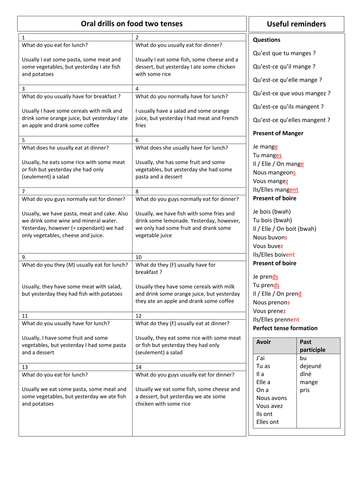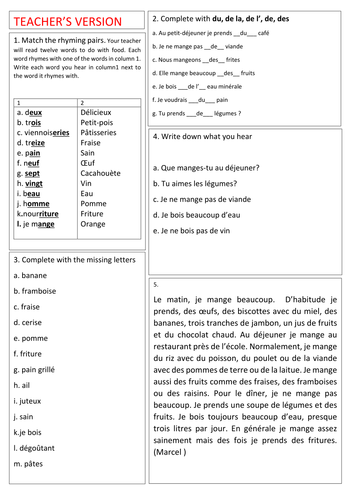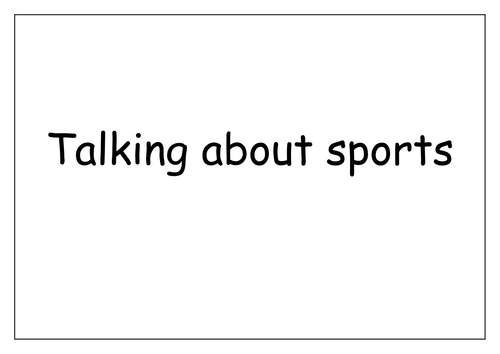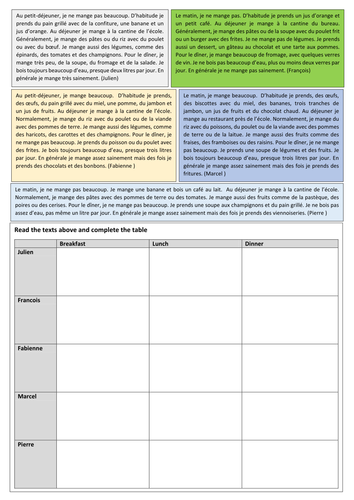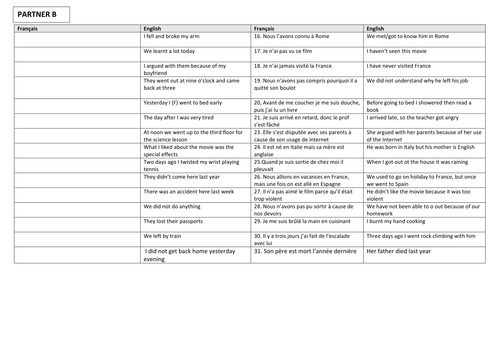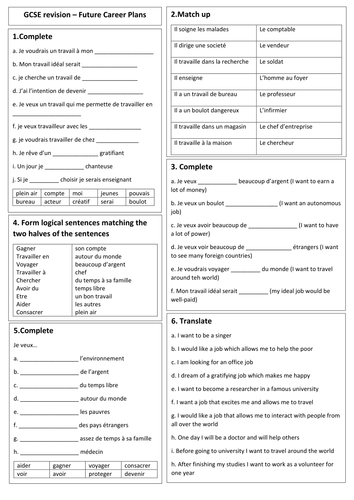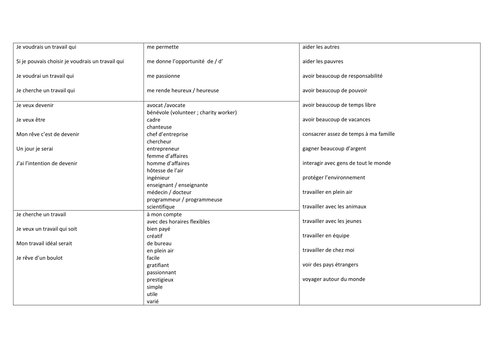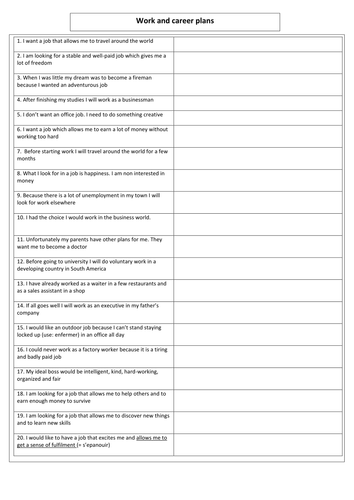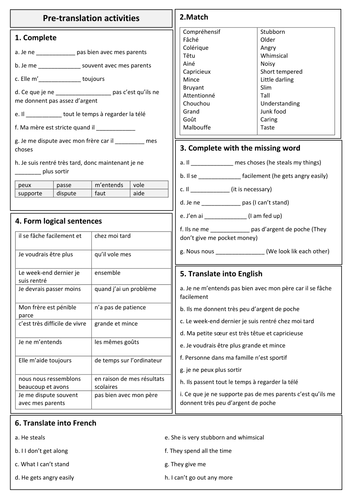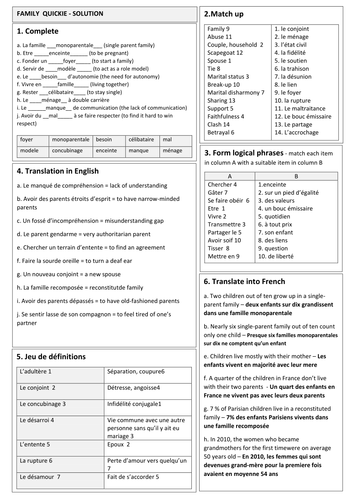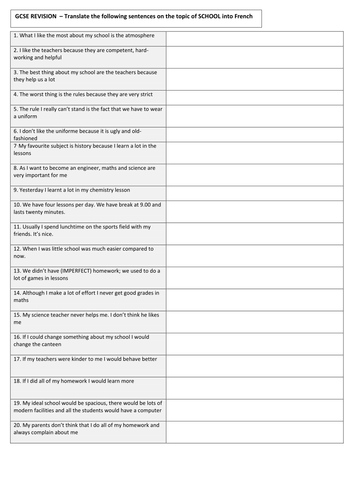
383Uploads
3139k+Views
5727k+Downloads
French

KS3 French - Sentence builder on food, narrow reading and oral drills (two tenses)
(1) A sentence builder modelling the use of two sentences (perfect tense and present tense) to say when and what you eat/ate with present and past time markers
(2) A set of oral drills with scaffold aside, to practise the material in the sentence builder orally
(3) narrow reading texts recycling the same chunks of language
(4) a vocab consolidation sheet

2017 KS3 French resources - Food (lstening, speaking, reading and translation)
New pool of resources on food, twelve to be exact

KS3/4 French - Irregular Perfect tense (sentence builder, translation and drills)
Typical Cont-style resources on the Irregular perfect tense

KS3 French - Booklet on sport (part 1)
First part of a booklet on talking about leisure in the present tense. 14 pages of activities including sentence builders, narrow reading, oral communicative drills and lots more drilling in jouer a / faire du + sport .
Vocab includes a wide range of nouns and adjectives, recycled and drilled in over and over again throughout the booklet across all four skills.

Beginner French - Narrow reading texts on food
A set of narrow reading texts on food with a comprehension activity
Bundle

French oral practice for GCSE revision
A bunch of resources including oral activities + pre-communicative activities.
Although some of them are labelled as KS3 they are actually suitable for average KS4 groups, too as they are address a specific grammar point or were designed for very able year 9 groups

GCSE revision - Oral ping-pong translation__perfect tense
Another oral ping-pong translation
INSTRUCTIONS - The students work in pairs. They have a sheet with the same English sentences to translate into French, but Partner A has the translation of sentences 1 to10, whereas Partner B has the translation of sentences 11 to 20.
I call it 'Oral ping-pong translation' because they do it orally, Partner A challenging Partner B with a sentence and showing the correct answer to provide them with feedback and to award points (3 for perfect sentence, 2 for one mistake only, 1 if there are mistakes but at least the verb is correctly formed). I give them a time limit (10 minutes); when the time is up the person with the higher score wins. Best to have people of similar ability in each pair. Here is an example: I made for a very able year 11 of mine. Obviously the activity can be done in writing too.
As a follow-up, I get the students to make a note of the most serious mistakes they made in their books so that I have an idea of what their problem areas are. Differentiation opportunities are obvious: different sets of sheets for groups of different ability

GCSE revision quickie with SOLUTION (March 2017) - World of Work (4)
quickie with answer key on world of work

GCSE French revision quickie (2017) - Present tense of irregular verbs (Solution provided )
A quickie covering key irregular verbs . Answer key provided on separate sheet

GCSE revision starter - Oral ping-pong translation on imperfect/conditional (amended version)
Oral pairwork - translation

GCSE French revision - Pool of resources on future plans
Includes:
- bilingual translation task
- revision quickies based on sentence builder with SOLUTION
- a very comprehensive sentence builder

GCSE revision - Translation on future career plans (French and English version)
A bilingual version of 20 model sentences covering key structures and vocabulary

GCSE revision - Translation on family relationships with solution and pre-translation tasks
14 model sentences of increasing complexity in French and English on separate sheets and a pre-reading set of activities practising the vocab in the translation

A LEVEL REVISION QUICKIE - FAMILY (WITH SOLUTION)
A challenging consolidation sheet for A-level students covering key vocabulary

KS3 French - Sentence builder on schoolday + vocabulary consolidation + translation
A sentence builder on activities and times
A translation based on the sentence builder

GCSE French revision - Translation from English to French on school (with answer key)
A set of twenty model sentences covering key vocabulary and sentence structures. French translation provided on separate page

KS3 French - Sentence builder, oral communicative drills and find-someone-who -with cards
- A sentence builder to introduce je vais acheter/je veux acheter / j'ai acheté with translation activities to go with it
- A find-someone-who with cards to practise the target vocabulary receptively
- A set of communicative drills to recycle the same language orally

